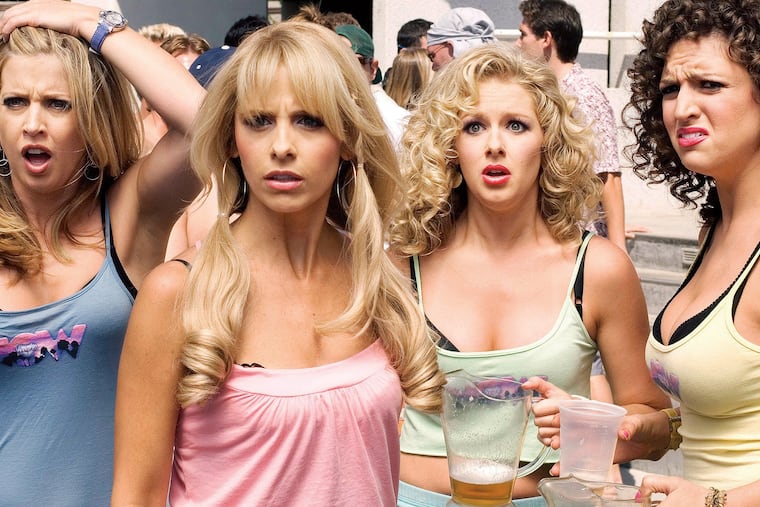Watch the ‘sprawling, sci-fi comedy’ cult classic that was booed out at Cannes
Philadelphia Film Society is bringing filmmaker Richard Kelly’s ‘Southland Tales’ to the city. 'Donny Darko' is also on the program.

Southland Tales is Richard Kelly’s lifework. When it premiered in competition, in an unfinished form, at 2006′s Cannes Film Festival, the sprawling, sci-fi comedy was practically booed out of France. Recut for U.S. theaters and released a year later, it didn’t fare much better.
Set in an alternate America where nuclear attacks kicked off a Third World War, national lockdowns, and the expansion of the Patriot Act into a Big Brother-styled security state, Southland Tales plays like a two-and-a-half-hour Mad TV sketch penned by Philip K. Dick. Starring Dwayne Johnson, Seann William Scott, Sarah Michelle Gellar, Mandy Moore, Jon Lovitz, and Justin Timberlake, Southland Tales was — and remains — a total oddity.
In the years since its initial flop(s), the film has amassed a dedicated cult. Fans puzzle over its hidden meanings and praise its director’s vision of an America gripped by a form of clownish fascism.
The Philadelphia Film Society is hosting the “Fluid Karma Tour,” a roving road show that includes the original theatrical cut, that rarely screened Cannes version, and Kelly’s debut, the apocalyptic teen angst dramedy Donnie Darko.
The Inquirer spoke to Kelly before his film’s weekend screening. This interview has been condensed and edited.
‘Southland Tales’ has been called “prescient” or “visionary.” Do you feel like you had some sense of clairvoyance, about where America was headed after 9/11?
I’m constantly telling stories about the apocalypse. The last thing that I want is for our world to get worse or more chaotic. I’m trying to find some sort of catharsis. I tried to find humor and levity in it. It’s a way of therapy. I don’t consider myself to be some kind of great student of history, in any way. I have a college degree, and I’m constantly reading the news. But I don’t see myself as being some incredibly articulate person, at all. This is all supposed to be funny!
The cast is largely made up of comic actors. Were you commenting on how the Bush years were full of ludicrous, or just-not-very-smart, people in the political sphere?
In this incredible kaleidoscope of people, the common denominator was they all had great comedy chops. They all owned pop culture property in our minds, and they were down to play. Making this crazy movie, I wanted every actor to want to be there. There were several actors that I met with who were just clearly like, “I just don’t think I’m going to RSVP to that party.” That’s totally fine.
Director Oliver Stone turned down a role. How did he shape your work?
Oliver was a really formative influence for me. Platoon was the first R-rated movie I snuck into. I wanted him to play the arms dealer in the ice cream truck, a role which ended up going to Christopher Lambert. Oliver was very flattered. I think he was amused. But I think it just wasn’t a risk he felt comfortable taking. But the fact that I got to intern for him, and we became friends, it was like an out-of-body experience for me.
A lot of people criticize ‘Southland Tales’ as incoherent. Were you trying to convey the feeling of being overwhelmed by images, and not knowing — as a viewer, as a person alive in the world — what to grasp onto?
There was a deliberate design strategy to have lots of screens. The camera is often pointed at a TV screen, and we’re seeing information play out on screens within screens. That was part of the structure of the narrative, where everyone is surveilling everyone. This was before Snowden. But there was a strong suspicion that with the Patriot Act, and all the legislation that happened after 9/11, that we were living in a surveillance state that we weren’t quite aware of yet. The aesthetic is tied to that surveillance.
Considering how critical of America the film is, does it feel appropriate to kick off the tour in Philadelphia, the very “birthplace” of America itself?
All the criticism comes from affection. You have to be careful these days. If you express a feeling of patriotism, it can be misconstrued as something negative. But I think part of being a responsible artist is that you have to be critical of your home team. I believe in satire that has more of an optimistic feeling to it. And for all the doom and gloom in Southland Tales, I feel like it is an optimistic film in the end.
The “Fluid Karma Tour” plays March 31-April 2 at the Philadelphia Film Center, 1412 Chestnut St., Phila. filmadelphia.org/nowshowing/